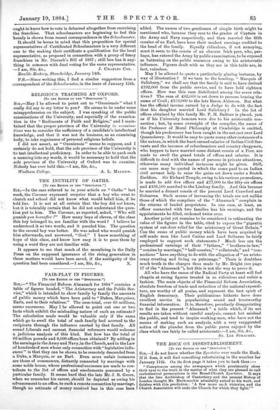FAIR-PLAY IN FIGURES.
[TO THE EDITOR 01 TIM "SPECTATOR."]
Bra,—" The Financial Reform Almanack for 1884" contains a table of figures headed, "The Aristocracy and the Public Ser- vice," which is intended to show family by family the amounts of public money which have been paid to "Dukes, Marquises, Earls, and to their relatives." The sum-total, over 66 millions, seems enormous. May I be allowed to point out one or two facts which exhibit the misleading nature of such an estimate ? The calculation made would be valuable only if the sums which go to swell the total of each family had accrued to the recipients through the influence exerted by that family. All sound Liberals and earnest financial reformers would welcome a judicious analysis of this kind. But how has the total of 66 million pounds and 8,000 offices been obtained ? By adding in the earnings in the Army and Navy, in the Church, and in the Law of hundreds of men whose only connection with "legislative influ- ences" is that they can be shown to be remotely descended from a Duke, a Marquis, or an Earl. Even more unfair instances are those of commoners, distantly connected by marriage with some noble house, whose professional successes are made to con- tribute to the list of offices and emoluments possessed by a particular family. It seems hard that the late Mr. J. R. Green, when we remember his career, should be depicted as owing his -advancement to an office, to such a remote connection by marriage, though no estimate of money received has in this case been added. The names of two gentlemen of simple birth might be mentioned who, because they rose to the grades of Captain in
the Army and Navy respectively, and then married the fifth cousins of an Earl, have here their 'modest earnings credited to the head of the family. Equally ridiculous, if not annoying, must it seem to the cousin of an obscure Irish peer, who, per- haps, has entered the Army by public examination, to be exposed as battening on the public resources owing to his aristocratic influence. Figures dealt with as they are in this table are, in fact, valueless.
May I be allowed to quote a particularly glaring instance, by way of illustration ? If we turn to the heading, "Marquis of Salisbury," we shall see that the family is said to have derived £192,000 from the public service, and to have held eighteen offices. How was this sum distributed among the seven rela- tives? The sum of £62,000 is set down to persons bearing the name of Cecil ; £10,000 to the late Baron Alderson. But what has the official income earned by a Judge to do with the fact that his daughter married Lord Salisbury ? In the list of offices obtained by this family Mr. F. M. Balfour is placed, just as if his University honours were due to his aristocratic con- nection; but, by some oversight of the compiler, the name of the Professor of Moral Philosophy at Cambridge is omitted, though his predecessor has been caught in the net cast over Lord Queensberry. It would be easy to quote many other instances of a like nature, in which the hard-earned salaries of Indian Civil Ser- vants and the incomes of schoolmasters and country clergymen, who happen to have married some distant cousin of a Peer, are mule to swell the grand totals of offices and salaries. It is difficult to deal with the names of persons in private situations, otherwise many individual instances might be given. Stilt one more may be quoted in which the sums paid to an Indian civil servant help to raise the gains set down under a Scotch Earldom. Sir Richard Temple, owing to his various promotions, is made, to add five offices and £77,000 to the fifty-six offices and 2436,500 ascribed to the Lindsay family. And this because he married a distant cough of the present Lord Crawford and Balcarres. Such means of increasing the totals are not unlike those of which the compilers of the " Almanack " complain in the returns of landed proprietors. In one case, at least, an officer connected with two families has his earnings, and the appointments he filled, reckoned twice over.
Another point yet remains to be considered ia estimating the value of the figures in the table, cited to expose the "gigantic system of out-door relief for the aristocracy of Great Britain."
Can the sums of public money which have been acquired by self-made men like Lord Cairns and Lord Selborne be fairly employed to support such statements ? Much less can the professional earnings of their "fathers," "brothers-in-law," "cousins by marriage," "half-cousins," " collaterals," and " con- nections " have anything to do with the allegation of" an aristo- cracy creating and living on patronage." There is doubtless much truth in the charges thus made by Mr. Bright (see page 17 of the "Almanack"), but this is not the way to prove it.
All who have the cause of the Radical Party at heart will feel chagrin at seeing figures treated in so ridiculous and unfair a fashion. The main objects of the Financial Reform Association, absolute freedom of trade and reduction of the national expendi- ture, are worthy of all praise, and represent the best spirit of English democracy. Their publications hitherto have done excellent service in popularising sound and trustworthy financial information. It is, therefore, peculiarly disappointing to find in the present " Almanack " a table which, if its net results are taken without careful analysis, cannot but mislead the public, and tend to inspire working-men, who have not the means of making such an analysis, with a very exaggerated notion of the plunder from the public purse enjoyed by the class which can fairly be called aristocratic.—I am, Sir, &c.,
Sr. Lox STRACHEY.


































 Previous page
Previous page